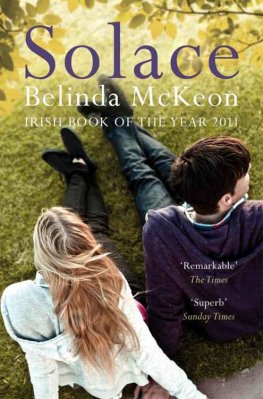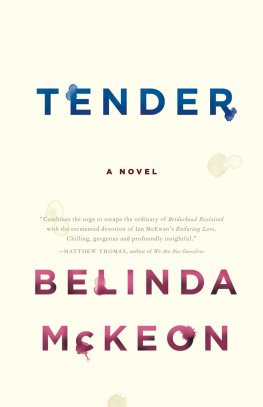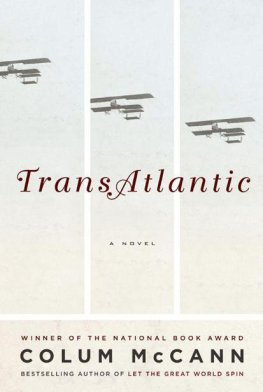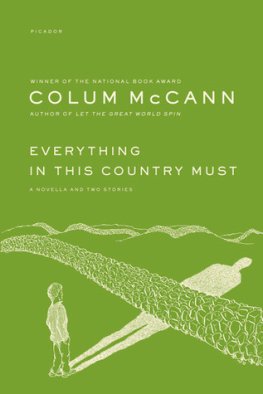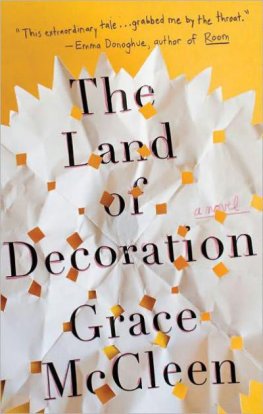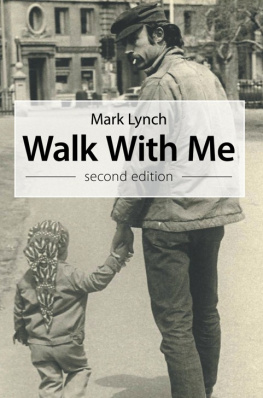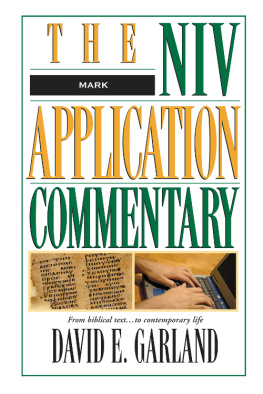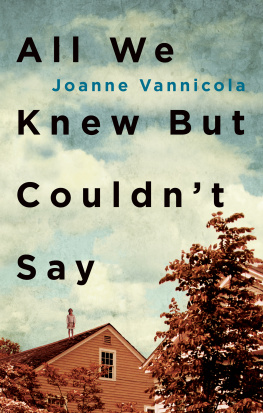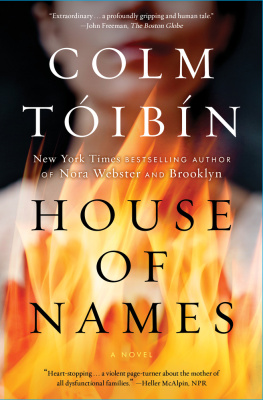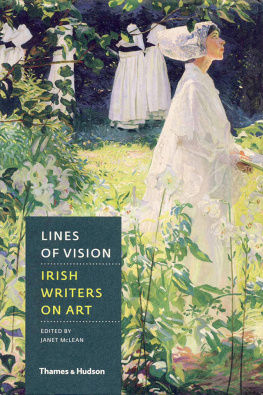. . for all the men of the world could not help us till we have gone through our time. .
From The Fate of The Children of Lir, translated by Lady Gregory.
It had been years since Toms son had spent so long at home. He stayed almost the whole summer, working the farm every day and sleeping in his old room, with the childs crib at the foot of the bed. The child, Tom thought, seemed content in her new surroundings. He saw in her no signs of lonesomeness, no signs that she was pining for what she could no longer have. That she could not yet speak, that she could not name names and call for them, that she could not tell them what she had seen; for all of this, Tom was grateful, and he carried the child about with him often, her wordlessness resting between them like a veil.
In August the weather turned. The mornings came blue and sun-dazed, a haze wrinkling the sky over the fields. When the forecast promised it would stay that way for days to come, red bands of high pressure stoking the country from the south, Tom and Mark readied to save the hay. Mark knocked three meadows the first warm evening, and Tom followed after him with the turner, whipping up the long blades of grass, setting them down neat as potato drills. As Mark began to bale two mornings later, Tom took the child to the edge of the meadow and showed to her the way it was done: the lines of grass, the huge yellow bales lurching out of the red machine, and the shape of her father in the tractor cab, a hand on the steering-wheel, his head turned to watch the progress of the baler hitched behind.
Wave at your daddy, Tom said.
The child sighed in his arms and crushed her hands into her eyes. She was only half awake, and the suns brightness was beating down on her. The sheepdog, the only thing certain to interest her and to set her pointing and smiling, was out of sight somewhere in the meadow. She had woken crying early that morning, early as she woke every morning, and, like all the other mornings, her father and her grandfather had been awake before her, watching the day as it came in over the bog.
As with all the other mornings, Tom had heard Mark moving around in the bedroom well before dawn; had heard the scuffling, the coughing, the opening and closing of the door across the landing, the slow tread down the stairs, the water drumming hard into the kettle, the feeble ravings of the radio. That morning when Tom joined him in the kitchen there had been more to talk about than usual, more things to plan, and although the timetable of a haymaking day was known to each of them so innately that there had been little need for them to speak at all, still Tom went with the chance while he had it. He mapped out all the parts of the day, the jobs to be done, the potential pitfalls and the safeguards to be laid in place. Mark answered him, and agreed with him, and talked along with him, and when at last the child awoke, crying from the bedroom above their heads as indignantly as though she had been tricked or struck, Tom thought he had seen flicker across Marks face an instant of the same regret he felt himself at the breaking of their peace. But too much flickered across Marks face these days for Tom to understand him. Too much went on with him, whether in silence or in the hiding-places behind talk, for Tom to keep pace with or pretend to know.
Now the tractor had stopped and Mark was standing, leaning out of the cab. He would need more twine, he shouted. Tom would have to go to Keoghs to buy it. This was not something they had talked about that morning; this was not something that, together, they had foreseen. Tom cursed as he turned and crossed the yard to where his mud-streaked jeep was parked. The child squirmed. She wanted to be down on the concrete, where she saw her tricycle with the red plastic wheels, where she had left scattered, the previous evening, a bucketful of her wooden bricks. But Tom kept her firmly on his hip. In the jeep, he buckled her fast into the baby seat he had fixed into the passenger side.
*
Thats a beautiful child.
The girl in Keoghs looked at the child the way every woman looked at her now. The same sad eyes, the head to one side, the same carefully held half-smile. The hand out to touch the childs curls, to stroke the soft face, to clasp the chubby fingers as though they been offered for a shake. Tom knew it well by now, the rush to sympathize in that overdone way of women; the tears quick to spring and quicker still to dry, to be replaced with a high laugh and a story about nothing.
Whats this her name is again?
Aoife.
Aoife. The usual sad wince. Hello, Aoife. Are you having a good time with your granddaddy?
Tom sat the child on the shop counter. She grabbed at a stand of chocolate bars, and he let her grab. He nodded to the girl. Would you be able to keep an eye on her for a few minutes while I go out the yard to your father?
The laugh, high as a fountain, there it was. Oh, now. Hes not my father. Im a good bit older than any of the Keogh girls. She shrugged, and Tom knew by the way she looked at him that he had pleased her. Down his elbows, shooting through his hands, he felt the burn of impatience. What did he care how old or how young she was? She was a girl: the arms out, the eyes wide the blouse more buttoned up, he saw now, than either of the Keogh girls would likely have worn theirs but it wasnt his concern to know such differences.
Well have a great time, Aoife and me, she was saying, nearly singing, as he went out the door.
*
Tar was soft underfoot in Keoghs yard. One dog slept between the bars of an upturned cattle feeder. Another sat alert on a stack of fertilizer bags. Keogh, his everyday white shirt untucked as a concession to the weather, was standing in the shade of the supplies shed, a huge, barn-like structure full of the things he sold to the farmers of the area: the feedstuffs for cattle and sheep, the seeds and grain, the bales of twine and the drums of oil. Fencing posts of different lengths and shades stood against the back wall. Tyres and hubcaps and old engine parts, culled from worn-out tractors and jeeps, were piled and hung and pegged in corners.
He watched as Tom approached, not moving or speaking until a few feet separated them. Keogh was a rich man. The half-rusted carburettors and planks of timber had made him more money, over the years, than had the bags of grain and the gallons of petrol and the shop and the bar all put together, but of this he showed no sign. The white shirt was the same shirt the whole week long: grubby by Tuesday, filthy by Thursday. The van he drove was years old, a Transit like a tinkers, deeply dented along one side. The house over the shop had changed little in the thirty-five years since he had bought it: no extension, rarely a new paint job, the old net curtains in the window, and the wife inside cooking his breakfasts and his teas. Toms wife Maura had said that Breda Keogh was driven half simple by her husbands meanness, that she had stopped asking for anything a long time ago, but that the daughters knew how to turn the pockets out on him, how to get their new clothes and their money for drinking and their two jelly-coloured cars. There were twin sons, too, as tight-fisted as Keogh himself, living in the house with him still and counting coins behind the bar, waiting for the day when they could split the place between them and watch it splintering to the ground. Keogh never mentioned them, never seemed to speak to them on the nights he ran the bar with them, never seemed to want for them in the yard or under the bonnet of a machine.
He was stepping away from the shed now, exhaling long and loudly as he frowned up at the sky. He stretched his hand out to Tom. Fierce fuckin heat, Tom, he said, as they shook. There was sweat sitting slick on his palm. He had what looked like axle oil smeared under one eye. He must have been up to a meadow with a part or a wheel already that morning. Hows all up in Dorvaragh?

